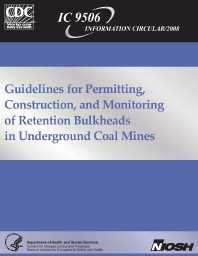Mining Product: Guidelines for Permitting, Construction, and Monitoring of Retention Bulkheads in Underground Coal Mines
Original creation date: June 2008
Many mining operations rely on retention bulkheads to provide a barrier between impounded water and active mine workings. However, bulkhead failures can cause catastrophic flooding that puts the underground workforce at risk. Underground observations and evaluations of existing bulkheads indicate that a systems approach is required when building an underground water or slurry retention system. In addition to engineering the bulkhead, the designer must ensure the quality control of materials and workmanship of the bulkhead, the reaction of the mine strata when exposed to water under pressure, and methods to monitor the performance of the retention system. Researchers from the National Institute for Occupational Safety and Health (NIOSH), with the assistance of the Mine Safety and Health Administration (MSHA), conducted an extensive review of bulkhead permits submitted to the MSHA Technical Support office in Bruceton, PA. In addition, the researchers visited accessible bulkhead installations at underground mining operations to gather information related to construction practices, maintenance issues, and monitoring and emergency response procedures. The guidelines in this report are to be used as a tool to identify areas or conditions that could impact the long-term stability of an underground fluid retention system and to give direction in addressing these situations.
Authors: SP Harteis, DR Dolinar, TM Taylor
Information Circular - June 2008
NIOSHTIC2 Number: 20034101
Pittsburgh, PA: U.S. Department of Health and Human Services, Public Health Service, Centers for Disease Control and Prevention, National Institute for Occupational Safety and Health, DHHS (NIOSH) Publication No. 2008-134, Information Circular 9506, 2008 Jun; :1-48
See Also
- Discharge Water Handling and Treatment: Problems and Solutions at a Large Pittsburgh Seam Coal Mine
- The Effects of Disaster on Workers: A Study of Burnout in Investigators of Serious Accidents and Fatalities in the U.S. Mining Industry
- The Effects of Water Emulsified Fuel on Diesel Particulate Matter Concentrations in Underground Mines
- HazComWriter - 3.1.3
- MSHA Media Event Highlights Mine Rescue Capabilities
- NIOSH Mining Update - New Publications 1995-96
- Performance of a Light-scattering Dust Monitor in Underground Mines
- Results of In-Mine Research in Support of the Investigation of the Sago Mine Explosion
- Technology News 469 - Sensors Warn of Hazards During Mine Hoisting
- USBM Health and Safety Legacy Continues Under NIOSH
- Content source: National Institute for Occupational Safety and Health, Mining Program


 ShareCompartir
ShareCompartir
